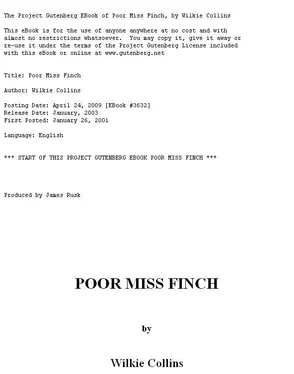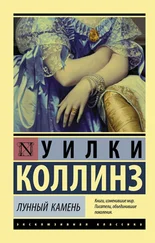Уилки Коллинз - Poor Miss Finch
Здесь есть возможность читать онлайн «Уилки Коллинз - Poor Miss Finch» весь текст электронной книги совершенно бесплатно (целиком полную версию без сокращений). В некоторых случаях можно слушать аудио, скачать через торрент в формате fb2 и присутствует краткое содержание. Год выпуска: 2002, Жанр: Классическая проза, на английском языке. Описание произведения, (предисловие) а так же отзывы посетителей доступны на портале библиотеки ЛибКат.
- Название:Poor Miss Finch
- Автор:
- Жанр:
- Год:2002
- ISBN:нет данных
- Рейтинг книги:3 / 5. Голосов: 1
-
Избранное:Добавить в избранное
- Отзывы:
-
Ваша оценка:
- 60
- 1
- 2
- 3
- 4
- 5
Poor Miss Finch: краткое содержание, описание и аннотация
Предлагаем к чтению аннотацию, описание, краткое содержание или предисловие (зависит от того, что написал сам автор книги «Poor Miss Finch»). Если вы не нашли необходимую информацию о книге — напишите в комментариях, мы постараемся отыскать её.
Poor Miss Finch — читать онлайн бесплатно полную книгу (весь текст) целиком
Ниже представлен текст книги, разбитый по страницам. Система сохранения места последней прочитанной страницы, позволяет с удобством читать онлайн бесплатно книгу «Poor Miss Finch», без необходимости каждый раз заново искать на чём Вы остановились. Поставьте закладку, и сможете в любой момент перейти на страницу, на которой закончили чтение.
Интервал:
Закладка:
Fortune had favored me at last. My lucky star had led me to the mistress of the house.
I made my best curtsey, and found myself confronting a large, light-haired, languid, lymphatic lady—who had evidently been amusing herself by walking up and down the room, at the moment when I appeared. If there can be such a thing as a damp woman —this was one. There was a humid shine on her colorless white face, and an overflow of water in her pale blue eyes. Her hair was not dressed; and her lace cap was all on one side. The upper part of her was clothed in a loose jacket of blue merino; the lower part was robed in a dimity dressing gown of doubtful white. In one hand, she held a dirty dogs'-eared book, which I at once detected to be a Circulating Library novel. Her other hand supported a baby enveloped in flannel, sucking at her breast. Such was my first experience of Reverend Finch's Wife—destined to be also the experience of all aftertime. Never completely dressed; never completely dry; always with a baby in one hand and a novel in the other—such was Finch's wife.
"Oh! Madame Pratolungo? Yes. I hope somebody has told Miss Finch you are here. She has her own establishment, and manages everything herself. Have you had a pleasant journey?" (These words were spoken vacantly, as if her mind was occupied with something else. My first impression of her suggested that she was a weak, good-natured woman, and that she must have originally occupied a station in the humbler ranks of life.)
"Thank you, Mrs. Finch," I said. "I have enjoyed most heartily my journey among your beautiful hills."
"Oh! you like the hills? Excuse my dress. I was half an hour late this morning. When you lose half an hour in this house, you never can pick it up again, try how you may." (I soon discovered that Mrs. Finch was always losing half an hour out of her day, and that she never, by any chance, succeeded in ending it again, as she had just told me.)
"I understand, madam. The cares of a numerous family—"
"Ah! that's just where it is." (This was a favorite phrase with Mrs. Finch). "There's Finch, he gets up in the morning and goes and works in the garden. Then there's the washing of the children; and the dreadful waste that goes on in the kitchen. And Finch, he comes in without any notice, and wants his breakfast. And of course I can't leave the baby. And half an hour does slip away so easily, that how to overtake it again, I do assure you I really don't know." Here the baby began to exhibit symptoms of having taken more maternal nourishment than his infant stomach could comfortably contain. I held the novel, while Mrs. Finch searched for her handkerchief—first in her bedgown pocket; secondly, here, there, and everywhere in the room.
At this interesting moment there was a knock at the door. An elderly woman appeared—who offered a most refreshing contrast to the members of the household with whom I had made acquaintance thus far. She was neatly dressed, and she saluted me with the polite composure of a civilized being.
"I beg your pardon, ma'am. My young lady has only this moment heard of your arrival. Will you be so kind as to follow me?"
I turned to Mrs. Finch. She had found her handkerchief, and had put her overflowing baby to rights again. I respectfully handed back the novel. "Thank you," said Mrs. Finch. "I find novels compose my mind. Do you read novels too? Remind me—and I'll lend you this one to-morrow." I expressed my acknowledgments, and withdrew. At the door, I look round, saluting the lady of the house. Mrs. Finch was promenading the room, with the baby in one hand and the novel in the other, and the dimity bedgown trailing behind her.
We ascended the stairs, and entered a bare white-washed passage, with drab-colored doors in it, leading, as I presumed, into the sleeping chambers of the house.
Every door opened as we passed; children peeped out at me, screamed at me, and banged the door to again. "What family has the present Mrs. Finch?" I asked. The decent elderly woman was obliged to stop, and consider. "Including the baby, ma'am, and two sets of twins, and one seven months' child of deficient intellect—fourteen in all." Hearing this, I began—though I consider priests, kings, and capitalists to be the enemies of the human race—to feel a certain exceptional interest in Reverend Finch. Did he never wish that he had been a priest of the Roman Catholic Church, mercifully forbidden to marry at all? While the question passed through my mind, my guide took out a key, and opened a heavy oaken door at the further end of the passage.
"We are obliged to keep the door locked, ma'am," she explained, "or the children would be in and out of our part of the house all day long."
After my experience of the children, I own I looked at the oaken door with mingled sentiments of gratitude and respect.
We turned a corner, and found ourselves in the vaulted corridor of the ancient portion of the house.
The casement windows, on one side—sunk deep in recesses—looked into the garden. Each recess was filled with groups of flowers in pots. On the other side, the old wall was gaily decorated with hangings of bright chintz. The doors were colored of a creamy white, with gilt moldings. The brightly ornamented matting under our feet I at once recognized as of South American origin. The ceiling above was decorated in delicate pale blue, with borderings of flowers. Nowhere down the whole extent of the place was so much as a single morsel of dark color to be seen anywhere.
At the lower end of the corridor, a solitary figure in a pure white robe was bending over the flowers in the window. This was the blind girl whose dark hours I had come to cheer. In the scattered villages of the South Downs, the simple people added their word of pity to her name, and called her compassionately—"Poor Miss Finch." As for me, I can only think of her by her pretty Christian name. She is "Lucilla" when my memory dwells on her. Let me call her "Lucilla" here.
When my eyes first rested on her, she was picking off the dead leaves from her flowers. Her delicate ear detected the sound of my strange footstep, long before I reached the place at which she was standing. She lifted her head—and advanced quickly to meet me with a faint flush on her face, which came and died away again in a moment. I happen to have visited the picture gallery at Dresden in former years. As she approached me, nearer and nearer, I was irresistibly reminded of the gem of that superb collection—the matchless Virgin of Raphael, called "The Madonna di San Sisto." The fair broad forehead; the peculiar fullness of the flesh between the eyebrow and the eyelid; the delicate outline of the lower face; the tender, sensitive lips; the color of the complexion and the hair—all reflected, with a startling fidelity, the lovely creature of the Dresden picture. The one fatal point at which the resemblance ceased, was in the eyes. The divinely-beautiful eyes of Raphael's Virgin were lost in the living likeness of her that confronted me now. There was no deformity; there was nothing to recoil from, in my blind Lucilla. The poor, dim, sightless eyes had a faded, changeless, inexpressive look—and that was all. Above them, below them, round them, to the very edges of her eyelids, there was beauty, movement, life. In them—death! A more charming creature—with that one sad drawback—I never saw. There was no other personal defect in her. She had the fine height, the well-balanced figure, and the length of the lower limbs, which make all a woman's movements graceful of themselves. Her voice was delicious—clear, cheerful, sympathetic. This, and her smile—which added a charm of its own to the beauty of her mouth—won my heart, before she had got close enough to me to put her hand in mine. "Ah, my dear!" I said, in my headlong way, "I am so glad to see you!" The instant the words passed my lips, I could have cut my tongue out for reminding her in that brutal manner that she was blind.
Читать дальшеИнтервал:
Закладка:
Похожие книги на «Poor Miss Finch»
Представляем Вашему вниманию похожие книги на «Poor Miss Finch» списком для выбора. Мы отобрали схожую по названию и смыслу литературу в надежде предоставить читателям больше вариантов отыскать новые, интересные, ещё непрочитанные произведения.
Обсуждение, отзывы о книге «Poor Miss Finch» и просто собственные мнения читателей. Оставьте ваши комментарии, напишите, что Вы думаете о произведении, его смысле или главных героях. Укажите что конкретно понравилось, а что нет, и почему Вы так считаете.






